- Home
- Jack Canfield
Chicken Soup for the African American Woman's Soul Page 3
Chicken Soup for the African American Woman's Soul Read online
Page 3
She bent down to me and put her hands on my shoulders. “Did you enjoy your walk today, baby?”
I looked at Nanny, and we smiled at each other. Then I turned to cousin Mittie and said “Yes, ma’am, I sure did!”
These were, literally, the building blocks of my childhood.
H. Renay Anderson
These Precious Hands
Hands the shade of caramel, mocha, honey, chocolate
and brown
It is in the midst of these precious hands that strength
can be found.
It begins with Mother’s coffee hands that caress me as I
grow inside
When I am born, these same hands reach out
and nestle me with pride.
Mother, let me see your hands.
Hands the shade of tan, coffee, beige, pecan and brown
It is in the midst of these precious hands that strength
can be found.
Look at this grandmother’s weathered and calloused
chocolate hands
Strong enough to work in a factory and field
Yet soft enough to soothe a bruised knee and tender
enough to heal.
Grandmother, let me see your hands.
Hands the shade of caramel, ebony, copper and brown
It is in the midst of these precious hands that strength
can be found.
Sister, let me see your hands.
Mocha hands whose fingers skillfully glide over piano
keys.
Pecan hands strongly clasped together as they pray on
bended knees.
Nimble chocolate hands that give you that warning tap,
to let you know that you’re still in her sight.
Ebony hands that embrace you to let you know that
everything is all right.
Hands the shade of honey, mocha, coffee and brown.
It is in the midst of these precious hands that strength
can be found.
I look at the past and see mocha hands united together
in the civil rights movement.
I see honey hands sacrificing to bless women in the
present.
Copper hands that handle the gavel in the judge’s seat.
Ebony hands that perform surgery and coffee hands that
teach.
Nutmeg hands that bake warm pound cakes and sweet
potato pie,
Served with a heaping side of seasoned wisdom that’s
too delicious to deny.
Hands the shades of honey, caramel, coffee and brown
It is in the midst of these precious hands that strength
can be found.
Mother, let me see your hands.
I treasure these precious hands that guard and surround
me
I am here because these precious hands have always
been around me.
Grandmother, let me see your hands.
These hands are cherished because they are connected to
the heart
Love is channeled through these hands and fingers with
tenderness to impart.
Sister, let me see your hands.
Hands the shade of espresso, bronze, ebony and brown
It is in the midst of these precious hands that strength
can be found.
Sheila P. Spencer
My Mother’s Shoes
There were many days when I wanted to walk in my mother’s shoes.
On a warm July morning in 2004, I shut and locked the door of my house. As I walked down the multicolored brick sidewalk, I felt uneasy butterflies dance in my stomach. My mother had been having pain in her hip, and my brother and I agreed to accompany her to hear what a specialist had concluded.
Less than an hour later, we were seated inside a cramped office. Although the doctor smiled optimistically, the uneasy feeling returned. With precise words, he explained to us that arthritis was not the cause of our mother’s discomfort in her bones—it was a rare form of cancer called multiple myeloma. When the doctor explained that the X-rays also revealed that my mother had a fracture in her back, I felt my courage buckle under the weight of heavy words, and I tried to tolerate hearing more details. I watched my mother take off her glasses, but to my amazement, she appeared unmoved as she listened intently. Feeling as if this were happening to me, I excused myself, in search of a temporary haven. I slowly shut the bathroom door and peered into the mirror. My face was red and the tears in my eyes clouded my vision.
I felt an incredible sense of fear grab me, and I could not shake it loose. If I were feeling this, what did it feel like to be in her shoes?
Returning to my mother’s home, the car ride was quiet and unnerving. As we paused at red lights, I did not know what to say to someone who just learned that many aggressive approaches would be attempted to slow down the progression of an incurable type of cancer. On the walkway, as we passed a large shrub, I gently grabbed my mother’s elbow, helping her up four small steps. She looked at me like a soldier and said, “Andrea, I’m blessed.
Something can be done for me.” I was amazed that my mother felt blessed in the midst of this storm. By the time we reached her bedroom, I sat on the bed next to my mother, and a rush of honesty invaded my lips. While placing one arm around her, I confessed my sorrow regarding what we found out, thanked her for all of the sacrifices that she made for so many people, and promised to stand by her side, no matter what she would endure.
Her shoes and my shoes would remain side by side.
I drove home replaying the day’s events in my head, until I reached my driveway. As I placed my feet on the stone-lined driveway, I felt the sun beat upon my back, but the sight of treetops delivered a soothing presence.
Feeling defeated, I sighed and walked up the walkway, noticing a large box sitting on the porch. When I stood in full view of it, I read my name and the sender’s address.
My first box of books had arrived from the printer—I was officially a self-published author. As I lifted the large box and lugged it into the house, I wondered if God was playing some sort of cruel joke on me. I was faced with a difficult decision to devote my full attention to supporting my mother, or divide my time between my literary venture and her needs. After driving to my mother’s house the next day, I watched the smile form on her face as she held my book in her hands. Sister soldier did not relent. She never complained about her circumstances—her happiness overshadowed all other issues. Instantly, I made up my mind that I would handle both responsibilities well. If my mother signed up to be a soldier, I did too. Her shoes transformed into army boots, and I went in search of mine.
Although my mother began her treatment, she also collected money for book sales and told me that she would help me make calls when she could. Once again, her resilience amazed me. When she received her first treatment, I sat in the room with her for a while. I placed her tote bag next to the recliner where she sat and noticed the signed copy of my book inside it. Upon leaving the room, she spoke of the other cancer patients’ strength. Who was I to feel defeated, if she did not?
Her pride gave me strength, and I pressed forward over many months. To our surprise, I even made the bestseller’s list at a popular chain in my area.
Unfortunately, my mother’s condition continued to fluctuate, and she ultimately took a turn for the worse. After several blood transfusions, she was scheduled for surgery to install a port in her chest. As I carefully lifted my mother’s right foot, to stick it inside her black, slimline Easy Spirit shoe, my spirit revealed that she would not return home again. I spent many nights crying but managed to drag myself out to promote my book. A short time thereafter, a tumor was found on her lung, and the cancer began spreading rapidly. Making my mother comfortable became the only remaining option. I could not imagine what it must have felt like to be in her shoes.
When I entered her hospital room, I asked her t
o squeeze my hand if she could hear me. Although her pale hand shook, she mustered the strength to greet me. I read the Bible to her and reaffirmed that she was loved and appreciated. Although she could no longer talk, I could feel a sense of unity swirl in the air and felt my strength rise. During this time, I had secured my first radio interview and explained where I was going to my mother.
Although her eyes were closed, she smiled, and I knew that I would make it through the interview, despite my jumbled thoughts.
Less than six months after diagnosis, my mother departed to heaven. After her funeral, I found it difficult to do more than sleep or cry. I had written only one chapter of my new book, and I knew that my mother, my best friend, would want me to continue striving to meet my goals. Over time I got stronger. My appetite returned, and I pulled myself together and was able to write the sequel to my first novel.
Almost a year later I helped a delivery driver unload a truck full of boxes. After we finished, I dropped to my knees in my basement and cried tears of joy in thanks to my mother for being my role model. I knew she was looking down smiling.
One day I was unable to find my tennis shoes. My eyes fell on the same Easy Spirit shoes that my mother wore the final time she was dressed to journey to the hospital.
In between sniffling, I grabbed the shoes and decided that I would overcome the fear of no longer being able to physically speak to my mother. I put them on and decided that I would wear the shoes to the gym, as a symbolic representation of two soldiers: Mom and me. As I sprinted around the track, with each lap I completed, I felt her strength comfort me.
So this is what it feels like to be in my mother’s shoes.
Andrea Blackstone
My “Shero”
Dreams come a size too big so that we can grow into them.
Josie Bisset
All of my childhood and early adult life my mom weighed over 220 pounds. I could feel the pain that my mom experienced with her obesity—not because I had a weight problem, but because our family was so close, and I often watched Mom when no one else was looking. I would see the hollow look in her face as if she lost something a long time ago and was still searching for it. I had no idea that I would soon find out what my mom had actually lost.
She never came to any school events, even though I ran track, swam competition, did water ballet, was a cheerleader, was in student council and many other things. I have no memory of my mother attending anything with me at all. My father made it his responsibility to participate in many of these activities with me, which ultimately led me to forge a greater bond with my dad than with my mom. I often wondered why she chose not to participate in my activities and even wondered if she maybe didn’t love me enough to support me. My bitterness and hurt toward my mom’s lack of involvement in my life only became heightened as I moved into my later teen years. I found myself resenting her for her choices and criticizing her for her complacency. I looked for female role models elsewhere, away from my mother.
I was never embarrassed about my mother, but I think she was embarrassed about herself, and that feeling was painful for all of us. I would hear stories about when my mother was younger. She used to be the family’s number one dancer, dancing all night and lasting longer on the dance floor than all the other guests that came to visit. I longed to know this dancing lady, as I was the dancer of my generation, known for my own smooth moves; I wanted to share that joy with my mom. Maybe the dance floor would be the common ground where we would finally connect! I had never seen this dancing woman, though; the woman I grew up with had traded in her dancing shoes for house slippers.
As I became an adult and interested in psychology and self-development, I began to understand people better. I soon realized that my mom loved me and did for me as much as she could. After a while, I understood that my mom was in pain; however, I did not know how to help her. Fortunately, from somewhere, she found the strength to help herself.
After more than twenty years of battling obesity, my mother completed a vigorous eighteen-month diet that left her ninety pounds lighter than before. A new woman was born! At age twenty-eight, I got a newmom!When I looked at her, I knew she was my mom, but I could not believe that she was real. This jubilant, energetic and lively woman was all mine to call Mom. For the first time, I met the woman my mother truly was, the beautiful little lady underneath the obesity. She now weighed a whopping 125 pounds. It wasn’t so much her new body that was the surprise, but rather her new spirit.
To celebrate her new size and to rededicate herself to dance, my mother joined a “Mrs. Forty-Plus” competition, where she would have to model, give a speech and provide a dance performance. She told our family that she did not care if she won—she simply had always wanted to be in a pageant, to walk down a runway and perform on stage.
She told each one of us, “I’m not doing it to win; I’m doing it to dance!”
“I’m not doing it to win; I’m doing it to celebrate.”
“I’m not doing it to win; I’m doing it because . . . now I can!”
The competitionwas intense!Many women—well–seasoned with their elegant salt-and-pepper hair—graced the runway with style and assurance. Ther ewere many beautiful women there full of talent and grace, but none had just accomplished the amazing feat my mom had to get herself to this place of confidence. I prayed that my mom would win, but while watching her on stage I was simply overjoyed just by her effort. To me, she had already won. She posed to perfection, her speech brought tears to everyone’s eyes, and her performance emulating Janet Jackson stopped the show. She spun, she kicked, and she even danced on the chair like Janet Jackson did in her onstage performances. Who was this lady on stage with black leggings, a rhinestone vest, a headmicro-phone and a Rhythm Nation baseball cap looking like a professional performer?
That night, at age forty-three, my mother was crowned “Mrs. Forty-Plus.” She was the first person in our family to ever win such a title. With this new woman, my mother was born again. She gave herself a new chance at life—as a model, a dancer, a mother and a friend. At age twenty-eight, I met my “shero.”
Lisa Nichols
What She Said
A successful person is one who can lay a firm foundation with the bricks that others throw at him/her.
David Brinkley
The words Mama flung at me on a summer day in 1978 stabbed me in so many places I figured I’d ache and bleed forever.
“This is what I get,” she said, “for working my fingers to the bone raising somebody else’s child. You wouldn’t have done this if your daddy was still alive.”
I was stunned. Had I heard her right? “Whose child you raised?” I asked, puzzled.
“Your daddy’s. You .”
We were sitting outside, lapping up lemonade and sharing a pint of vanilla ice cream. That was the way we communicated in those days, substituting homemade lemonade for “I’m glad to see you,” and bowls of ice cream for “I love you.” But on this sun-scorched afternoon,Mama, stung by my new, short Afro and sassy ways, finally blurted out what was in her heart.
I could hear the pride in her voice as she talked about how she’d raised me and rescued her marriage. After so many years of living a lie, it seemed to free her to dump our family’s secrets on a table and slice them open. But I was angry at her, angry at Daddy, angry at Grandma Eva, angry at Aunt Minnie and angry at anyone else who’d known the truth but kept it buried.
After six or seven months, I finally packed away my anger, dried my tears and began using the journalistic skills I’d learned in the news rooms, hammering Mama with questions about my birth mother. The state of Alabama had never been able to find a birth certificate for Betty Jean DeRamus, the name I’d always believed was mine. However, state workers quickly found one for Betty Jean Nesby, a baby girl born on the same day and year as I was. The story was as true as rain and as real as Grandma’s Bible.
Now I understood why Mama had always forgotten my birthdays. Now I understood why her all
-consuming love seemed to change at times to resentment once I reached my teens. Her remarks about my long, lank hair, my tan skin and my full lips—all so different from her own—made sense, too. I could even forgive her for once telling one of my friends that it was too bad I lacked her beauty. She’d been watching me become her worst nightmare, a young woman who looked like her rival.
Yet I was still knee-deep in sorrow and still churning with questions. According to my newly acquired birth certificate, my birth mother came from Monroe County, Mississippi, and already had another child when she gave birth to me in Tuscaloosa, Alabama. And according to Mama, my birth mother had willingly handed me over to my dad. I don’t think I’ll ever know where my father found the courage to bring me home to his wife. Or why Mama, childless though she was, agreed to raise her husband’s love child by another woman. But the two of them had indeed leaped aboard a train in Alabama and got off it in Detroit, a city where they created a life for me without bothering with any uncomfortable paperwork or truths.
But a funny thing happened while I was packing my bags for a trip to the South that I hoped would enable me to pick up the trail of my maternal relatives, including, perhaps, my biological mother. I woke up that morning with a familiar phrase dancing in my head—“It takes a whole village to raise a child.”
I recalled that during the slavery era there had been honorary “aunts” and “uncles” on every plantation, ready to wrap their arms around youngsters separated from their parents and school them in the art of survival. Those traditions endured in the twentieth century and beyond.
My friend’s mother raised the daughter my friend had when she was sixteen. The child grew up believing her mother was her older sister. And just about every black family I knew could tell stories about “cousins” who were actually family friends and “mothers” who were really open-hearted neighbors.
Mostly, though, I remembered those times when Mama had shown up at my elementary school in the middle of the day, bringing raincoat and boots to protect me from a simmering storm.

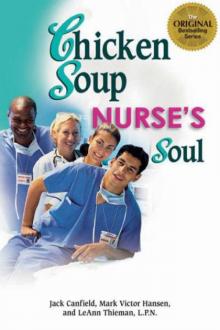 Chicken Soup for the Nurse's Soul: Second Dose
Chicken Soup for the Nurse's Soul: Second Dose Chicken Soup for the Ocean Lover's Soul
Chicken Soup for the Ocean Lover's Soul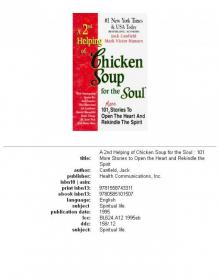 A 2nd Helping of Chicken Soup for the Soul
A 2nd Helping of Chicken Soup for the Soul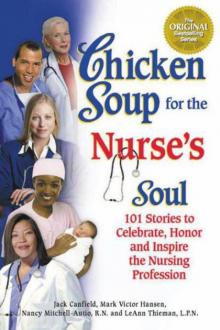 Chicken Soup for the Nurse's Soul
Chicken Soup for the Nurse's Soul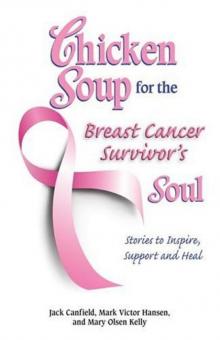 Chicken Soup for the Breast Cancer Survivor's Soul
Chicken Soup for the Breast Cancer Survivor's Soul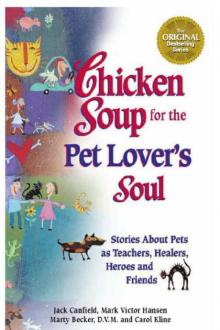 Chicken Soup for the Pet Lover's Soul
Chicken Soup for the Pet Lover's Soul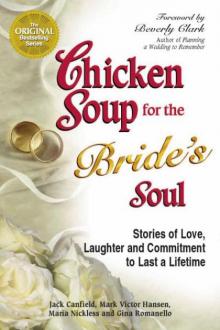 Chicken Soup for the Bride's Soul
Chicken Soup for the Bride's Soul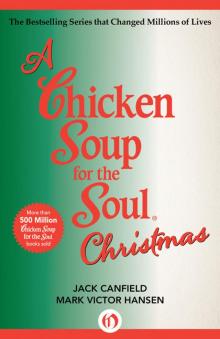 A Chicken Soup for the Soul Christmas
A Chicken Soup for the Soul Christmas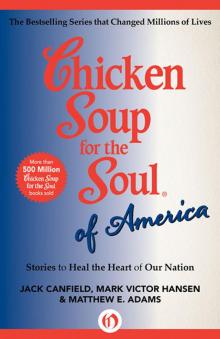 Chicken Soup for the Soul of America
Chicken Soup for the Soul of America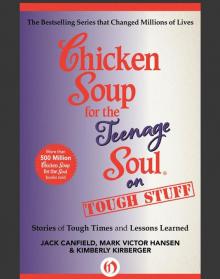 Chicken Soup for the Teenage Soul on Tough Stuff
Chicken Soup for the Teenage Soul on Tough Stuff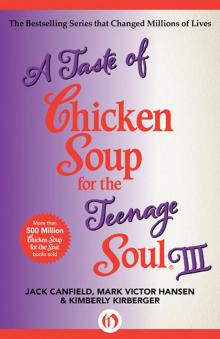 A Taste of Chicken Soup for the Teenage Soul III
A Taste of Chicken Soup for the Teenage Soul III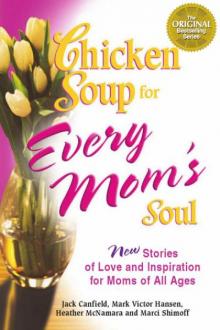 Chicken Soup for Every Mom's Soul
Chicken Soup for Every Mom's Soul Chicken Soup for the Dog Lover's Soul
Chicken Soup for the Dog Lover's Soul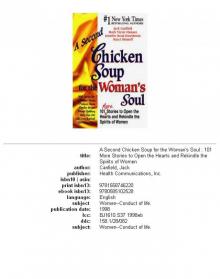 A Second Chicken Soup for the Woman's Soul
A Second Chicken Soup for the Woman's Soul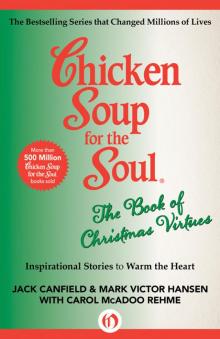 Chicken Soup for the Soul the Book of Christmas Virtues
Chicken Soup for the Soul the Book of Christmas Virtues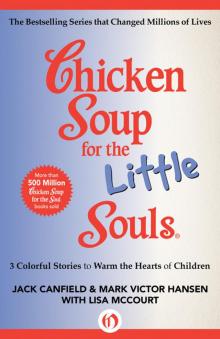 Chicken Soup for the Little Souls: 3 Colorful Stories to Warm the Hearts of Children
Chicken Soup for the Little Souls: 3 Colorful Stories to Warm the Hearts of Children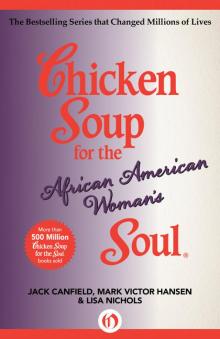 Chicken Soup for the African American Woman's Soul
Chicken Soup for the African American Woman's Soul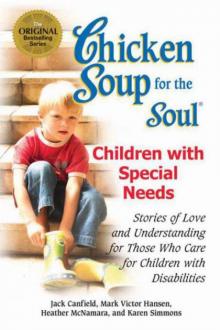 Chicken Soup for the Soul
Chicken Soup for the Soul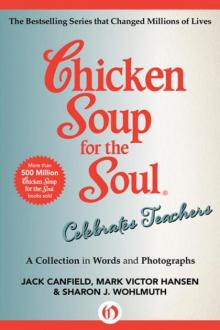 Chicken Soup for the Soul Celebrates Teachers
Chicken Soup for the Soul Celebrates Teachers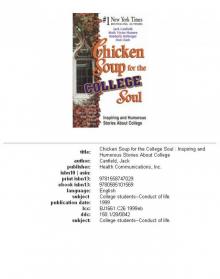 Chicken Soup for the College Soul
Chicken Soup for the College Soul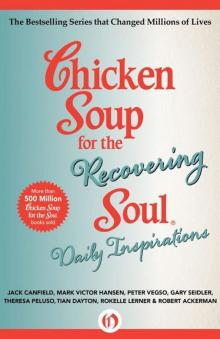 Chicken Soup for the Recovering Soul Daily Inspirations
Chicken Soup for the Recovering Soul Daily Inspirations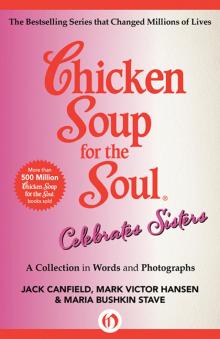 Chicken Soup for the Soul Celebrates Sisters
Chicken Soup for the Soul Celebrates Sisters Chicken Soup for the Dieter's Soul
Chicken Soup for the Dieter's Soul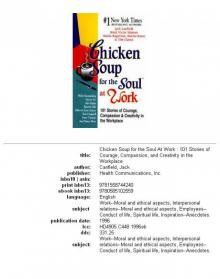 Chicken Soup for the Soul at Work 101 Stories of Courage
Chicken Soup for the Soul at Work 101 Stories of Courage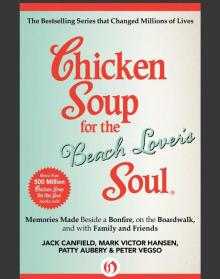 Chicken Soup for the Beach Lover's Soul
Chicken Soup for the Beach Lover's Soul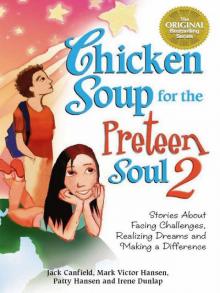 Stories About Facing Challenges, Realizing Dreams and Making a Difference
Stories About Facing Challenges, Realizing Dreams and Making a Difference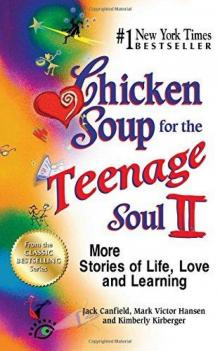 Chicken Soup for the Teenage Soul II
Chicken Soup for the Teenage Soul II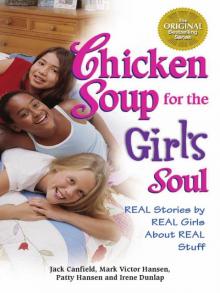 Chicken Soup for the Girl's Soul
Chicken Soup for the Girl's Soul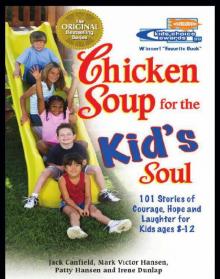 Chicken Soup for the Kid's Soul: 101 Stories of Courage, Hope and Laughter
Chicken Soup for the Kid's Soul: 101 Stories of Courage, Hope and Laughter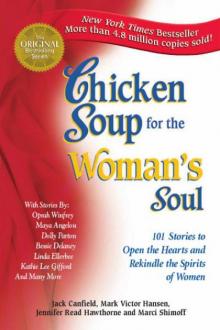 Chicken Soup for the Woman's Soul
Chicken Soup for the Woman's Soul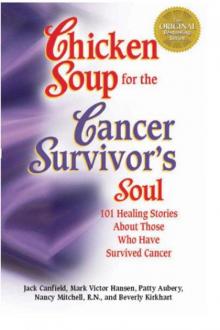 Chicken Soup for the Cancer Survivor's Soul
Chicken Soup for the Cancer Survivor's Soul Chicken Soup for the Canadian Soul
Chicken Soup for the Canadian Soul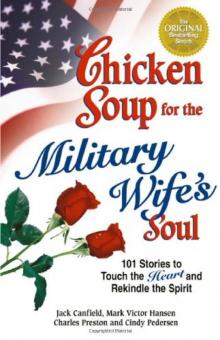 Chicken Soup for the Military Wife's Soul
Chicken Soup for the Military Wife's Soul A 4th Course of Chicken Soup for the Soul
A 4th Course of Chicken Soup for the Soul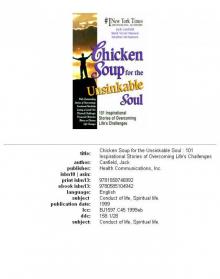 Chicken Soup Unsinkable Soul
Chicken Soup Unsinkable Soul Chicken Soup for the Soul: Christmas Magic
Chicken Soup for the Soul: Christmas Magic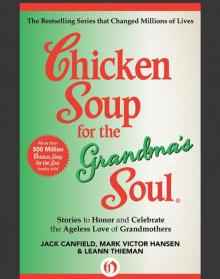 Chicken Soup for the Grandma's Soul
Chicken Soup for the Grandma's Soul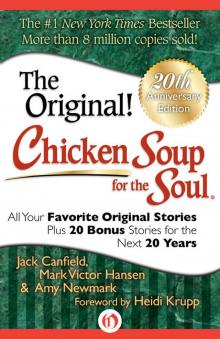 Chicken Soup for the Soul: All Your Favorite Original Stories
Chicken Soup for the Soul: All Your Favorite Original Stories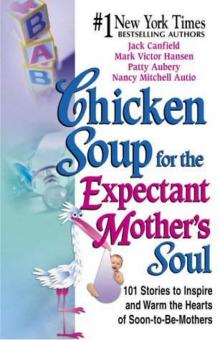 Chicken Soup for the Expectant Mother's Soul
Chicken Soup for the Expectant Mother's Soul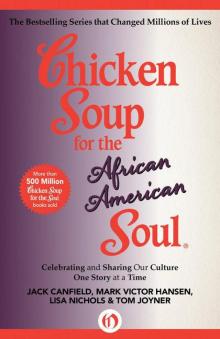 Chicken Soup for the African American Soul
Chicken Soup for the African American Soul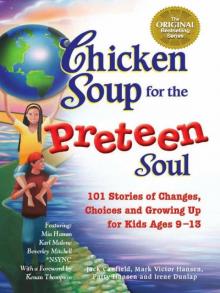 101 Stories of Changes, Choices and Growing Up for Kids Ages 9-13
101 Stories of Changes, Choices and Growing Up for Kids Ages 9-13 Christmas Magic
Christmas Magic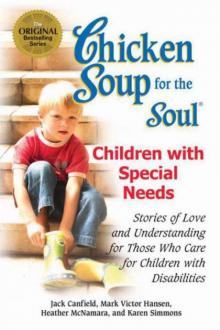 Chicken Soup for the Soul: Children with Special Needs
Chicken Soup for the Soul: Children with Special Needs Chicken Soup for the Soul: Country Music: The Inspirational Stories behind 101 of Your Favorite Country Songs
Chicken Soup for the Soul: Country Music: The Inspirational Stories behind 101 of Your Favorite Country Songs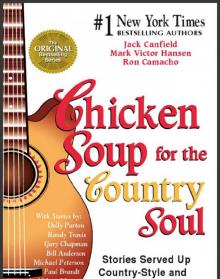 Chicken Soup for the Country Soul
Chicken Soup for the Country Soul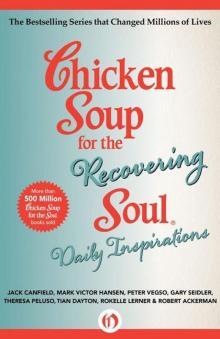 Chicken Soup for the Recovering Soul Daily Inspirations (Chicken Soup for the Soul)
Chicken Soup for the Recovering Soul Daily Inspirations (Chicken Soup for the Soul)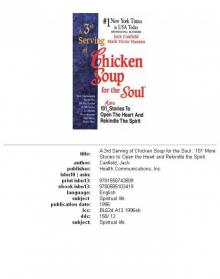 A 3rd Serving of Chicken Soup for the Soul
A 3rd Serving of Chicken Soup for the Soul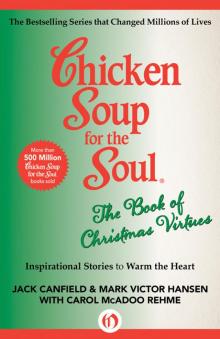 The Book of Christmas Virtues
The Book of Christmas Virtues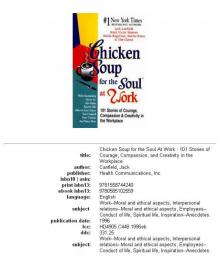 Chicken Soup for the Soul at Work
Chicken Soup for the Soul at Work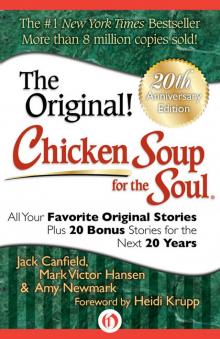 Chicken Soup for the Soul 20th Anniversary Edition
Chicken Soup for the Soul 20th Anniversary Edition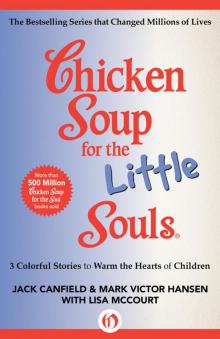 Chicken Soup for the Little Souls
Chicken Soup for the Little Souls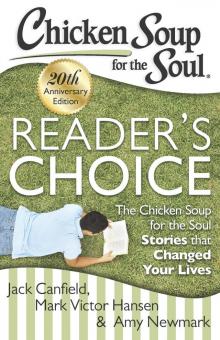 Chicken Soup for the Soul: Reader's Choice 20th Anniversary Edition
Chicken Soup for the Soul: Reader's Choice 20th Anniversary Edition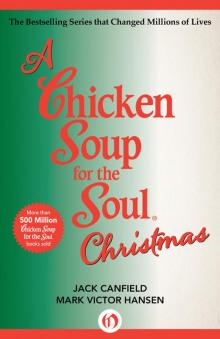 Chicken Soup for the Soul Christmas
Chicken Soup for the Soul Christmas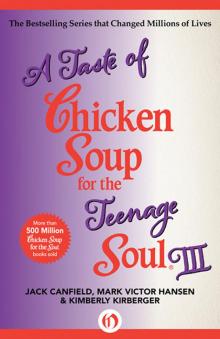 Taste of Chicken Soup for the Teenage Soul III
Taste of Chicken Soup for the Teenage Soul III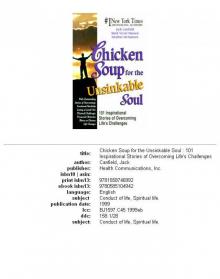 Chicken Soup for the Unsinkable Soul
Chicken Soup for the Unsinkable Soul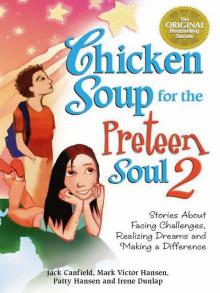 Chicken Soup for the Preteen Soul II
Chicken Soup for the Preteen Soul II